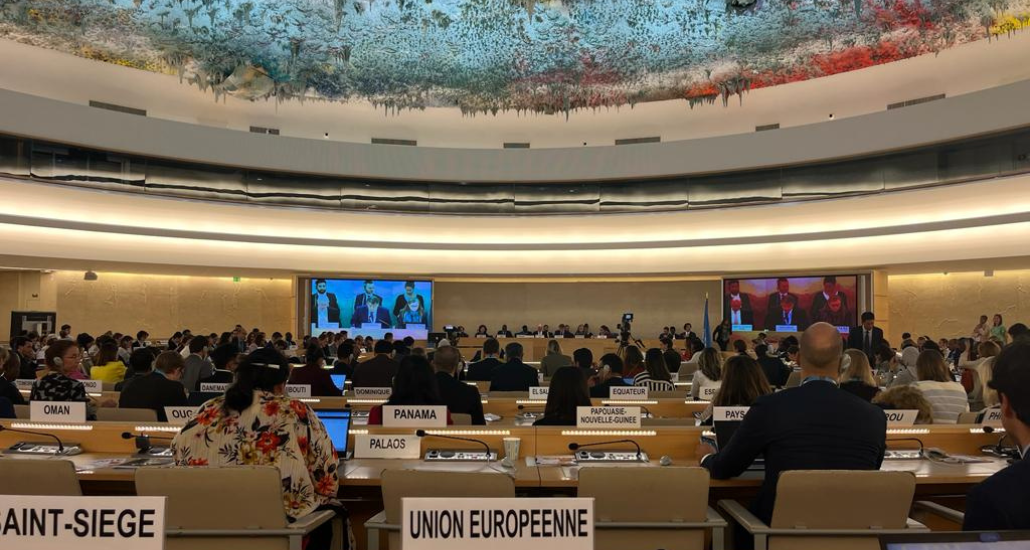The EU at the 54th session of the UN Human Rights Council

During this session, the EU led two resolutions:
A resolution on Afghanistan, which was adopted by the Council by consensus, extended the mandate of the Special Rapporteur. “Human rights in Afghanistan are in a state of collapse,” said the EU in its statement introducing the resolution. “Afghanistan is the only country in the world where women and girls are denied access to secondary and higher education and are erased from all spheres of public life. We call upon the Taliban to reverse its policies and practices that abuse human rights of people in Afghanistan, bringing them in line with Afghanistan’s international human rights obligations.”
The EU also presented a resolution on the human rights situation in Burundi, extending the mandate of the Special Rapporteur. This will ensure continued monitoring of the human rights situation, support to civil society, and expert recommendations that can help both the government of Burundi and the international community. “We hope that next year, as a newly elected Council member, Burundi will feel the opportunity as well as the responsibility to re- re-engage constructively with the HRC and with the Office of the High Commissioner,” says the EU in its statement.
The EU also underlined, wherever possible, our strong condemnation of all violations of international human rights law and IHL committed in the context of the Russia’s war of aggression against Ukraine. “The atrocities, destruction and suffering in Ukraine unleashed by this flagrant violation of the UN Charter have led to human rights challenges across the world by escalating the current global food, economic and energy crisis. We persistently urge Russia to fully abide by its obligations under international law and cease its aggression against Ukraine entirely, unconditionally, and immediately.”
The EU also led a Joint Statement, signed by 45 countries, on the human rights situation in Ethiopia. “We are deeply concerned about the latest findings of the International Commission of Human Rights Experts in Ethiopia (ICHREE) and others that human rights violations and abuses continue to be committed in Ethiopia. Credible transitional justice and accountability processes are crucial to ensuring lasting peace and reconciliation in Ethiopia. We call upon the Government of Ethiopia to ensure that the future policy meets regional and international human rights standards. The coming months are critical in terms of making tangible progress, in view also of the next session of this Council.”
The EU also raised at the Council the urgent human rights situations, among others in Sudan, Myanmar, Syria, Russia, Belarus, Iran, Israel and oPT, Sri Lanka, DRC, Somalia, Nicaragua, Yemen and Venezuela.
The EU actively participated in the annual discussion on gender, where we underlined once more that gender equality and non-discrimination are two fundamental principles which underpin the realization of human rights, and essential values and priorities of the EU’s internal and foreign policy. As Team Europe, we stressed the need for an ambitious and transformative approach to address the root causes and risk factors of gender inequality, discrimination and violence against women and girls.
In the Interactive Dialogue with the Special Rapporteur on contemporary forms of racism we stated the EU’s commitment to the promotion and protection of human rights for all without discrimination on any ground. “Racism, racial discrimination, xenophobia and related intolerance are an affront to human dignity and have to be overcome. We will continue to condemn racism in all its forms and manifestations, whether perceived or actual. Racism must not only be addressed, it must be eliminated, in all its forms and across all strands of society.”
The EU and its Member States, also called ‘Team Europe’, led together 13 resolutions at this session, addressing human rights in Russia and Sudan, the right to privacy, rights of peasants, reprisals, preventable maternal mortality, human rights of older persons, the right to care, World Programme for Human Rights Education, enforced disappearances and the question of the death penalty.





